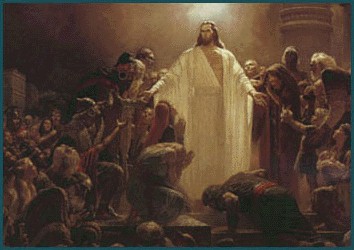 Keep
your eyes open!...
Keep
your eyes open!... Keep
your eyes open!...
Keep
your eyes open!...
In a Vatican press release the Pope
warned
against attempts to predict future eschatological events:
GENERAL AUDIENCE: THE LAST COMING OF CHRIST
VATICAN CITY, APR 22, 1998 (VIS) - In today's General Audience in St. Peter's Square, the Pope said that, while we are moving towards the Jubilee of the Year 2000, we are invited "to look forward, in the hope of the second coming of Christ at the end of time."
"The passion, death and resurrection of the Lord are the supreme event of the history of humanity. ... The resurrection of the dead which we hope for at the end of time, plays an important role now, in the spiritual resurrection, the primary objective of the work of salvation. This involves the new life given by the Risen Christ, as the fruit of his redeeming work."
John Paul II went on to say that Christian eschatology is "a historical process which has already begun and which is moving towards fullness. ... The apocalyptic images of the eschatological discourse of Jesus concerning the end of all things must be interpreted as being symbolic. They express the precariousness of the world and the sovereign power of Christ who holds the destiny of humanity in his hands. History is moving towards its end, but Christ has given no chronological indicator. However, the attempts to predict the end of the world are illusory and misleading. Christ has assured us only that the end will not arrive before his saving work has reached its universal dimension, through the proclamation of the Gospel."
"The Father gave to Jesus
the 'power to judge,
because he is the Son of Man' ... that is, a person full of
understanding
and someone taking on the human condition. Christ is a divine judge
with
a human heart, a judge who wants to give life. Only the unrepentant
root
in evil can prevent him from giving this gift, for which he did not
hesitate
to face death."
AG/JUBILEE/... VIS 980422 (310)
More recently:
27-May-99 -- ZENIT News Agency
VATICAN CITY, MAY 26 (ZENIT).- During his usual Wednesday general audience, held under sunny skies in Saint Peter's Square, with some 15,000 pilgrims from all over the world, John Paul II addressed the question of the destiny and final goal of humanity.
The Pope hoped to dispel the fears emerging at this time, as we prepare to cross the threshold of the new millennium, and to stimulate reflection in a society where "everything happens at incredible speed, be it because of scientific and technological discoveries, or because of the media's influence."
The Pontiff's reply was clear and simple. "We do not have information on the date of this event." He came to this conclusion after a brief review of all the references in the Bible on the end of the world, beginning with the book of Exodus and ending with the vision of the Apocalypse, not ignoring the prophecies of Ezekiel.
For this reason, "it is necessary to be patient in waiting for Jesus resurrected." A period of waiting which, as Christ himself said to his apostles, must be accompanied by "preaching and witnessing."
"The tension about the final event must be lived in serene hope, committed to the present moment in the construction of the Kingdom which at the end will be given by Christ into the Father's hands," the Pope said.
"Pilgrims in search of a
lasting home, we must
hope, as our fathers in the faith did, for a better homeland, in other
words, for heaven," the Holy Father concluded.